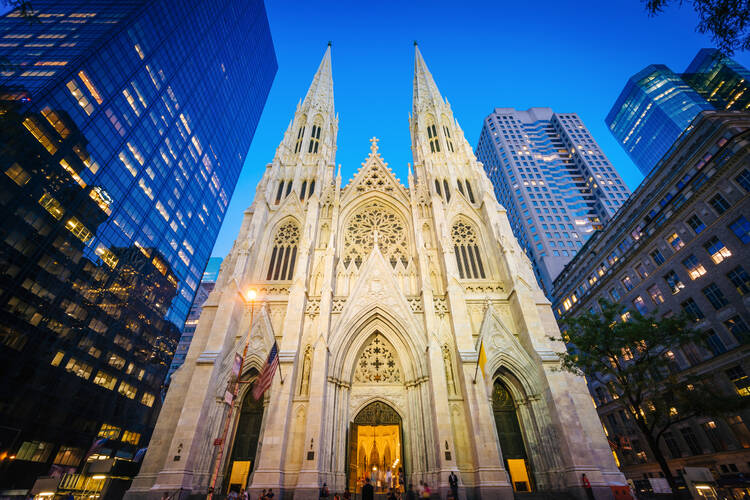“I don’t believe in God, but God wanted me to be always, always, the star of the show.”
This line comes from Cecilia Gentili’s one-woman show, “Red Ink,” and underscores the root cause of the controversy around Gentili’s funeral at New York’s St. Patrick’s Cathedral on Feb. 15.
Ms. Gentili, a noted transgender advocate for the L.G.B.T.Q. community, sex workers and people with H.I.V., died Feb. 6 in New York City. Gentili was raised Catholic but was a self-described atheist. The organizer of the funeral told The New York Times that Gentili’s family wanted the service to be held at St. Patrick’s Cathedral because “it is an icon, just like her.”
The cathedral obliged, learning only shortly before the funeral that Gentili was transgender and an atheist. While St. Patrick’s Cathedral hosting the funeral of a prominent transgender activist would have made history in its own right, Gentili’s sexual identity is not the central cause of the controversy that ensued. The real issues surfaced during the funeral itself. There we saw interruptions to the funeral rites, dancing in the main aisle, outfits that would be considered inappropriate in most any faith community and language considered disrespectful in a sacred space like “America’s parish church.”
To be clear, even if the cathedral knew from the beginning that Gentili was transgender, accepting the request in good faith to commend a soul to God is the exact kind of charitable and merciful action the church is called to perform. Were it not for the interruptions and disrespect shown to this sacred space, this would have been an occasion for rejoicing. Nearly 1,000 individuals from some of society’s most marginalized communities were welcomed into the iconic cathedral, before the font of mercy that is Jesus Christ and prayed for a deceased friend.
The cause of this controversy is not that some “other” communities came into a Catholic space, a church I called my parish for seven years, but something else. The L.G.B.T.Q. community and the sex workers Gentili advocated for deserve to be ministered to just like any other group because they, too, are an integral part of the church. If the church’s salvific mission is universal and God’s mercy is without end, then the cathedral acted properly and should continue to do so.
No, what caused this travesty was the radical culture of individualism that pervades our society and was made manifest during the funeral.
This is not to say that the individual is “bad.” The “individual” as a theological and anthropological concept is highly developed in the life of the church and can be summarized by simply stating that each person is formed in the image and likeness of God and thus has innate dignity. This is a bedrock principle of Catholic social teaching, and we must orient ourselves and our society around respect, mercy and justice for the individual.
“Individualism,” on the other hand, is a radical, destructive form of ultra-relativism and has been one of the bogeymen of papal teachings for the last 125-plus years. Individualism runs counter to—and is antagonistic toward—true human relationships. Individualism places all the needs and desires of the individual above the common good and relegates relationships to the broader community into a removed, secondary position. It fails to include the feelings and needs of others in the formation of individual consciences.
In his social encyclical “Rerum Novarum,” Pope Leo XIII noted there must be a balance between the two. “Civil society exists for the common good, and hence is concerned with the interests of all in general,” Leo XIII wrote, “albeit with individual interests also in their due place and degree.”
Some 80 years later, St. Paul VI observed further developments in his encyclical “Octogesima Adveniens.” “An overemphasis of equality,” St. Paul VI wrote, “can give rise to an individualism in which each one claims his own rights without wishing to be answerable for the common good.”
Pope Francis has likewise addressed individualism during his pontificate. “Individualism does not make us more free, more equal, more fraternal,” Pope Francis writes in “Fratelli Tutti.” “Radical individualism is a virus that is extremely difficult to eliminate, for it is clever. It makes us believe that everything consists in giving free rein to our own ambitions, as if by pursuing ever greater ambitions and creating safety nets we would somehow be serving the common good.”
A society that does not balance the needs of the individual with common interests, that prizes individualism over relationships and community, is not a healthy society. Unfortunately, the organizers of Gentili’s funeral, who should not be seen as representative of the wider L.G.B.T. community, did not seem to care about the broader relationship between their communities and the church when they approached St. Patrick’s Cathedral. They focused on the “icon” they wished to celebrate while giving little thought, it seems, to the icon they were about to desecrate.
The tragedy here, as one Jesuit friend recently mentioned to me, is that mourners wanted the funeral to be in a Catholic space for non-Catholic reasons—entering into the physical church without entering into the spiritual church. It was wanted for “iconic” reasons, to make the deceased the “star of the show,” emphasizing the individual over the society. And what could have been a moment of healing turned into a cause célèbre—but maybe that was the point. I choose to think it was not.
However, it is still the church’s duty to shepherd souls to God. The church continues to be the house of the Lord, where all are welcome—transgender individuals, sex workers, immigrants and refugees, the sick and the poor, the mighty and the powerful, the affluent and the ignorant. And St. Patrick’s Cathedral should bury the next Cecilia Gentili that comes along—lest it, too, become another victim of the false icon of individualism.








